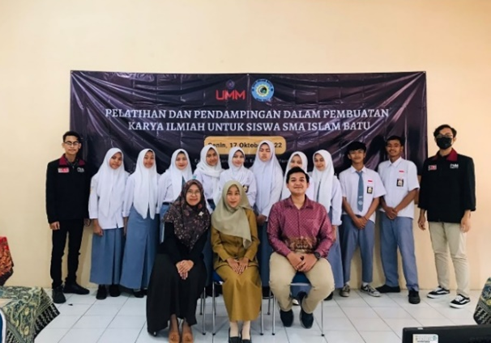Scientific writing: A way to improve students' information literacy and reasoning ability
DOI:
https://doi.org/10.22219/jcse.v4i2.25167Keywords:
information literacy, reasoning ability, scientific writingAbstract
The abilities students need to fulfill the SDGs are current information literacy and reasoning skills. Apart from going through the learning process, this ability can be developed by the participation of students in extracurricular activities related to scientific writing. This service activity aims to provide scientific writing assistance for students at Batu Islam High School to improve information literacy and reasoning skills. The form of training carried out is to provide material related to various research that can be carried out by students both inside and outside the classroom and provide assistance to take part in scientific writing competitions at the national level. The instruments for community service activities used are information literacy questions and observation sheets. Data analysis was carried out descriptively. The results of community service activities show that there is an increase in students' information literacy and reasoning abilities. The results of the participation of students in the national competition won the third prize
Downloads
References
Al-Aufi, A. S., Al-Azri, H. M., & Al-Hadi, N. A. (2017). Perceptions of Information Literacy Skills among Undergraduate Students in the Social Media Environment. International Information and Library Review, 49(3), 163–175. https://doi.org/10.1080/10572317.2017.1293416
Banik, P., & Kumar, B. (2019). Impact of Information Literacy Skill on Students’ Academic Performance in Bangladesh. International Journal of European Studies, 3(1), 27. https://doi.org/10.11648/j.ijes.20190301.15
Care, E., & Kim, H. (2018). Assessment of Twenty-First Century Skills: The Issue of Authenticity. 21–39. https://doi.org/10.1007/978-3-319-65368-6_2
Casanoves, M., Salvadó, Z., González, Á., Valls, C., & Novo, M. T. (2017). Learning genetics through a scientific inquiry game. Journal of Biological Education, 51(2), 99–106. https://doi.org/10.1080/00219266.2016.1177569
Chu, S. K. W., Tse, S. K., & Chow, K. (2011). Using collaborative teaching and inquiry project-based learning to help primary school students develop information literacy and information skills. Library and Information Science Research, 33(2), 132–143. https://doi.org/10.1016/j.lisr.2010.07.017
Çoklar, A. N., Yaman, N. D., & Yurdakul, I. K. (2017). Information literacy and digital nativity as determinants of online information search strategies. Computers in Human Behavior, 70, 1–9. https://doi.org/10.1016/j.chb.2016.12.050
Dzerefos, C. (2020). Reviewing education for sustainable development practices in South African eco-schools. Environmental Education Research, 26(11), 1621–1635. https://doi.org/10.1080/13504622.2020.1809637
Erich, A., & Popescu, C. (2010). The impact of information literacy in the academic education environment. Library and Information Science, 14, 150–161. https://www.researchgate.net/publication/265036131_The_Impact_of_Information_Literacy_in_the_Academic_Education_Environment
Flierl, M., Bonem, E., Maybee, C., & Fundator, R. (2018). Information literacy supporting student motivation and performance: Course-level analyses. Library and Information Science Research, 40(1), 30–37. https://doi.org/10.1016/j.lisr.2018.03.001
Hestiana, H., & Rosana, D. (2020). The Effect of Problem Based Learning Based Sosio-Scientific Issues on Scientific Literacy and Problem-Solving Skills of Junior High School Students. Journal of Science Education Research, 4(1), 15–21. https://doi.org/10.21831/jser.v4i1.34234
Hulett, H., Corbin, J., Karasmanis, S., Robertson, T., Salisbury, F., & Peseta, T. (2013). Information literacy at university: A toolkit for readiness and measuring impact. Australian Academic and Research Libraries, 44(3), 151–162. https://doi.org/10.1080/00048623.2013.813372
Karimi, Z., Ashrafi-Rizi, H., Papi, A., Shahrzadi, L., & Hassanzadeh, A. (2015). Effect of information literacy training course on information literacy skills of undergraduate students of Isfahan University of Medical Sciences based on ACRL standards. Journal of Education and Health Promotion, 4, 76. https://doi.org/10.4103/2277-9531.171789
Kim, M., & Pegg, J. (2019). Case analysis of children’s reasoning in problem-solving process. International Journal of Science Education, 41(6), 739–758. https://doi.org/10.1080/09500693.2019.1579391
Kinslow, A. T., Sadler, T. D., & Nguyen, H. T. (2018). Socio-scientific reasoning and environmental literacy in a field-based ecology class. Environmental Education Research, 4622, 1–23. https://doi.org/10.1080/13504622.2018.1442418
Klucevsek, K. M., & Brungard, A. B. (2016). Information literacy in science writing: how students find, identify, and use scientific literature. International Journal of Science Education, 38(17), 2573–2595. https://doi.org/10.1080/09500693.2016.1253120
Lobato, E. J. C., & Zimmerman, C. (2019). Examining how people reason about controversial scientific topics. Thinking and Reasoning, 25(2), 231–255. https://doi.org/10.1080/13546783.2018.1521870
Osborne, J. (2013). The 21st century challenge for science education: Assessing scientific reasoning. Thinking Skills and Creativity, 10, 265–279. https://doi.org/10.1016/j.tsc.2013.07.006
Permana, T. I., & Fatmawati, D. (2019). Pendampingan Penulisan Karya Ilmiah Remaja untuk Meningkatkan Kreativitas dan Literasi. International Journal of Community Service Learning, 3(3), 101. https://doi.org/10.23887/ijcsl.v3i3.20867
Prastika, M. D., Wati, M., & Suyidno, S. (2019). The Effectiveness of Problem-Based Learning in Improving Students Scientific Literacy Skills and Scientific Attitudes. Berkala Ilmiah Pendidikan Fisika, 7(3), 194. https://doi.org/10.20527/bipf.v7i3.7027
Ranaweera, P. (2017). Importance of information literacy skills for an information literate society. National Institute of Library & Information Sciences, University of Colombo, 1–13. https://doi.org/10.1017/CBO9781107415324.004
Sagala, N. L., Rahmatsyah, & Simanjuntak, M. P. (2017). The influence of problem based learning model on scientific process skill and problem solving ability of student. IOSR Journal of Research & Method in Education, 7(4), 1–9. https://doi.org/10.9790/7388-0704040109
Sato, M. (2013). Mereformasi sekolah-Konsep dan praktek komunitas belajar. PELITA/IDCJ.
Shao, X., & Purpur, G. (2016). Effects of Information Literacy Skills on Student Writing and Course Performance. Journal of Academic Librarianship, 42(6), 670–678. https://doi.org/10.1016/j.acalib.2016.08.006
Soleymani, M. R. (2014). Investigating the relationship between information literacy and academic performance among students. Journal of Education and Health Promotion, 3, 95. https://doi.org/10.4103/2277-9531.139677
Suwono, H., Permana, T., Saefi, M., & Fachrunnisa, R. (2021). The problem-based learning (PBL) of biology for promoting health literacy in secondary school students. Https://Doi.Org/10.1080/00219266.2021.1884586. https://doi.org/10.1080/00219266.2021.1884586
Talman, K., Vierula, J., Kanerva, A. M., Virkki, O., Koivisto, J. M., & Haavisto, E. (2020). Instruments for assessing reasoning skills in higher education: a scoping review. Assessment and Evaluation in Higher Education. https://doi.org/10.1080/02602938.2020.1776212
Xiao, F., Barnard-Brak, L., Lan, W., & Burley, H. (2019). Examining problem-solving skills in technology-rich environments as related to numeracy and literacy. International Journal of Lifelong Education, 38(3), 327–338. https://doi.org/10.1080/02601370.2019.1598507

Downloads
Published
How to Cite
Issue
Section
License
Copyright (c) 2023 Tutut Indria Permana, Diani Fatmawati, Moh. Mirza Nuryady, Ikmal Reza Fahlevy, Ivan Ardiansyah

This work is licensed under a Creative Commons Attribution-ShareAlike 4.0 International License.












